The Film Snob names his favorite films of the past year.
It was a good year for movies, if your viewing is not confined to Hollywood films. Many of the best reflected the unease of our times.
Here is my annual “favorites” list: as I’ve explained before, I do this a couple of months later than most film critics because the quality pictures from late in the previous year take longer to get to my neck of the woods than to LA, New York, or Chicago. I also need to say that some films, especially those in languages other than English, may take from a year to a year and a half to be available for viewing here in the States. So there are more than a few films on my list that are technically dated from 2022, or even ‘21.
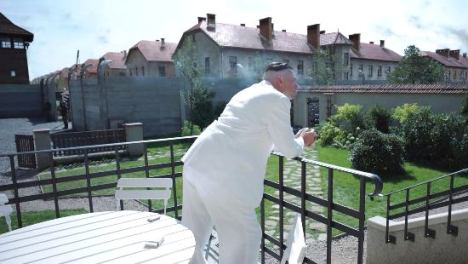 The Zone of Interest (Jonathan Glazer) is really in a class by itself. Ostensibly about a happy German family—mother, father, and five children—living in a prosperous home with servants, a flower garden, and swimming pool, we soon discover that the father is Rudolf Höss, a high-ranking Nazi officer, and their home is located right next to the Auschwitz death camp in Poland, of which he is the commandant. The idea is as simple and as chilling as that, yet Glazer keeps building on this premise to ever greater heights. It’s not just that the everyday interactions and minor struggles of this family convey a grotesque absurdity in the light of what we, the audience, know. It’s that we experience a kind of existential terror through the movie’s depiction of people treating as ordinary that which should freeze the soul of anyone with a conscience. We are forced to implicate ourselves in the normalizing of the unthinkable. The Zone of Interest is one of the most profound meditations on evil ever filmed.
The Zone of Interest (Jonathan Glazer) is really in a class by itself. Ostensibly about a happy German family—mother, father, and five children—living in a prosperous home with servants, a flower garden, and swimming pool, we soon discover that the father is Rudolf Höss, a high-ranking Nazi officer, and their home is located right next to the Auschwitz death camp in Poland, of which he is the commandant. The idea is as simple and as chilling as that, yet Glazer keeps building on this premise to ever greater heights. It’s not just that the everyday interactions and minor struggles of this family convey a grotesque absurdity in the light of what we, the audience, know. It’s that we experience a kind of existential terror through the movie’s depiction of people treating as ordinary that which should freeze the soul of anyone with a conscience. We are forced to implicate ourselves in the normalizing of the unthinkable. The Zone of Interest is one of the most profound meditations on evil ever filmed.
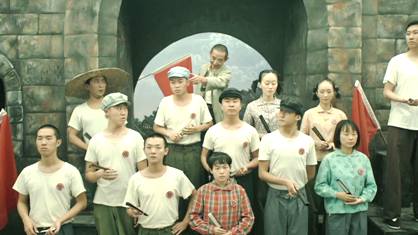 A New Old Play (Qiu Jiongjiong) is a masterful epic telling the story of a fictional Chinese opera troupe which covers the tragic and tumultuous history of China from the 1920s through the’70s. The style features the brilliant artificiality of the theater, with its masks, costumes and painted sets, alongside extensive tracking shots that places the viewer in the midst of the symbolic procession of the long and eventful life of a famous clown. A framing device shows this old man being confronted after his death by two spirits of the underworld, who accompany him to the afterlife while he reminisces about the many phases of his career. The film takes a darkly skeptical point of view about Chinese politics and its upheavals, the title signaling how the underlying conditions of social oppression are unchanged despite the superficial claims of revolution.
A New Old Play (Qiu Jiongjiong) is a masterful epic telling the story of a fictional Chinese opera troupe which covers the tragic and tumultuous history of China from the 1920s through the’70s. The style features the brilliant artificiality of the theater, with its masks, costumes and painted sets, alongside extensive tracking shots that places the viewer in the midst of the symbolic procession of the long and eventful life of a famous clown. A framing device shows this old man being confronted after his death by two spirits of the underworld, who accompany him to the afterlife while he reminisces about the many phases of his career. The film takes a darkly skeptical point of view about Chinese politics and its upheavals, the title signaling how the underlying conditions of social oppression are unchanged despite the superficial claims of revolution.
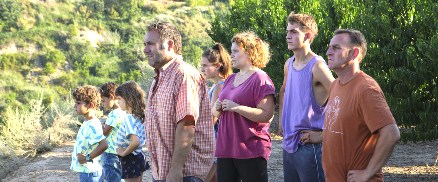 Alcarràs (Carla Simón) is an exquisitely composed film telling of an extended family of peach farmers in the Catalonia region of Spain. They are about to lose the farm to an owner that wants to convert the land for industrial use, and in this difficult process we experience the family from the point of view of each of its members, from the parents, uncles and aunts to the teenage children and little kids. Simón’s supple and versatile style brings this little vanishing world to rich and engaging life. Alcarràs translates our bond to the land we live on into beautiful, heart-rending poetry.
Alcarràs (Carla Simón) is an exquisitely composed film telling of an extended family of peach farmers in the Catalonia region of Spain. They are about to lose the farm to an owner that wants to convert the land for industrial use, and in this difficult process we experience the family from the point of view of each of its members, from the parents, uncles and aunts to the teenage children and little kids. Simón’s supple and versatile style brings this little vanishing world to rich and engaging life. Alcarràs translates our bond to the land we live on into beautiful, heart-rending poetry.
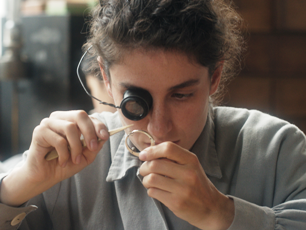 Unrest (Cyril Schäublin) clarifies the history of modern political struggle by taking us to an earlier, more fundamental period. In 1877, in a village in Switzerland, the owners of a clock and watch factory are trying to create the quickest and most streamlined production of watches they can by regimenting their workers’ every task, while the workers meanwhile organize an anarchist commune. It’s a film of ironic tranquility, in which the industrial and workers’ revolutions calmly work against each other’s interests. With detached humor and compassion, Unrest beautifully portrays the origins of our current divide.
Unrest (Cyril Schäublin) clarifies the history of modern political struggle by taking us to an earlier, more fundamental period. In 1877, in a village in Switzerland, the owners of a clock and watch factory are trying to create the quickest and most streamlined production of watches they can by regimenting their workers’ every task, while the workers meanwhile organize an anarchist commune. It’s a film of ironic tranquility, in which the industrial and workers’ revolutions calmly work against each other’s interests. With detached humor and compassion, Unrest beautifully portrays the origins of our current divide.
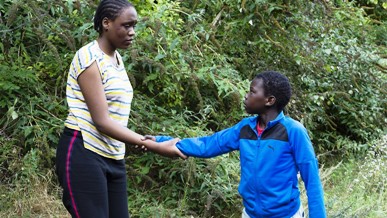 Tori and Lokita (Jean-Pierre & Luc Dardenne). The consistent excellence of the Dardenne brothers’ work for over four decades is reconfirmed by this tense drama about two migrant kids from Benin trying to live under the radar in Belgium. For purposes of asylum they claim to be brother and sister, but they’re just friends bonded by love and trust, navigating the harrowing danger and exploitation which is the daily experience of the undocumented.
Tori and Lokita (Jean-Pierre & Luc Dardenne). The consistent excellence of the Dardenne brothers’ work for over four decades is reconfirmed by this tense drama about two migrant kids from Benin trying to live under the radar in Belgium. For purposes of asylum they claim to be brother and sister, but they’re just friends bonded by love and trust, navigating the harrowing danger and exploitation which is the daily experience of the undocumented.
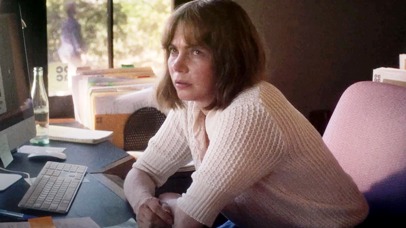 Showing Up (Kelly Reichardt) stars Michelle Williams as a sculptor at an art college whose introversion makes it incredibly difficult for her to deal with family, friends, or people in general while preparing for a show. The closest Reichardt has come to making a comedy, it’s a wry portrait of the clash between the practice of art and the demands of everyday life.
Showing Up (Kelly Reichardt) stars Michelle Williams as a sculptor at an art college whose introversion makes it incredibly difficult for her to deal with family, friends, or people in general while preparing for a show. The closest Reichardt has come to making a comedy, it’s a wry portrait of the clash between the practice of art and the demands of everyday life.
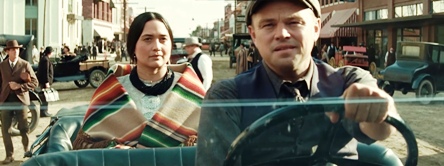 Killers of the Flower Moon (Martin Scorsese) dramatizes the true story of a series of murders in 1920s Oklahoma, in which the Osage Indians were targeted for wealth gained from oil being found on their land. Scorsese expands the murder story into an epic about a native community enduring the onslaught of predatory white Americans. It is classic cinema at its most elaborate.
Killers of the Flower Moon (Martin Scorsese) dramatizes the true story of a series of murders in 1920s Oklahoma, in which the Osage Indians were targeted for wealth gained from oil being found on their land. Scorsese expands the murder story into an epic about a native community enduring the onslaught of predatory white Americans. It is classic cinema at its most elaborate.
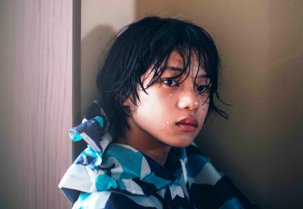 Monster (Hirokazu Kore-eda) is another gem in this director’s lifelong project telling meaningful stories of families and children. A pre-teen boy is getting in trouble at school. We experience his mother’s point of view, then a teacher’s, and finally, we follow the boy himself and learn the truth, more beautiful and heartbreaking than we imagined.
Monster (Hirokazu Kore-eda) is another gem in this director’s lifelong project telling meaningful stories of families and children. A pre-teen boy is getting in trouble at school. We experience his mother’s point of view, then a teacher’s, and finally, we follow the boy himself and learn the truth, more beautiful and heartbreaking than we imagined.
 De Humani Corporus Fabrica (Lucien Castaing-Taylor & Verena Paravel). In this immersive documentary, we observe the behavior of doctors, nurses, staff, and patients in Paris hospitals, in so intimate a way that you wonder how the filmmakers did it. In addition, we see multiple surgeries and procedures through the microscopic cameras that show the tunnel-like insides of people with the equally tiny surgical tools used to do the complicated work. A mind-blowing experience.
De Humani Corporus Fabrica (Lucien Castaing-Taylor & Verena Paravel). In this immersive documentary, we observe the behavior of doctors, nurses, staff, and patients in Paris hospitals, in so intimate a way that you wonder how the filmmakers did it. In addition, we see multiple surgeries and procedures through the microscopic cameras that show the tunnel-like insides of people with the equally tiny surgical tools used to do the complicated work. A mind-blowing experience.
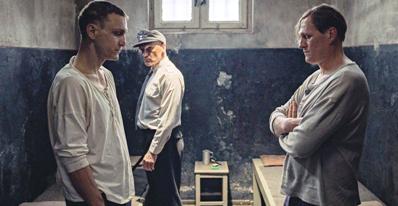 Great Freedom (Sebastian Meise). Under Hitler’s Germany, homosexuality was a crime. But the law didn’t change when the war ended. Franz Rogowski plays a gay man repeatedly imprisoned over decades. The story flashes back and forth in time as the main character develops an odd, touching relationship with a straight drug addict. It’s a film of devastating emotional power.
Great Freedom (Sebastian Meise). Under Hitler’s Germany, homosexuality was a crime. But the law didn’t change when the war ended. Franz Rogowski plays a gay man repeatedly imprisoned over decades. The story flashes back and forth in time as the main character develops an odd, touching relationship with a straight drug addict. It’s a film of devastating emotional power.
Here are some excellent B-sides:
Onoda (Arthur Harari)
All the Beauty and the Bloodshed (Laura Poitras)
Asteroid City (Wes Anderson)
No Bears (Jafar Panahi)
The Novelist’s Film (Hong Sang-soo)
Godland (Hlynur Pálmason)
Pacifiction (Albert Serra)
I Have Electric Dreams (Valentina Maurel)
May December (Todd Haynes)
Past Lives (Celine Song)
And I wish you a great movie-going 2024!
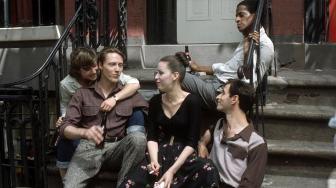
Next Stop, Greenwich Village, a 1976 film written and directed by Paul Mazursky, is a finely observed autobiographical portrait of youth in its first...

Mario Monicelli’s 1963 comedy/drama about a strike by factory workers in 19th century Turin is not as well known as it should be. The...

One of the more surprising recent developments in cinema for me has been the rise to fame of a Greek avant-garde filmmaker named Yorgos...